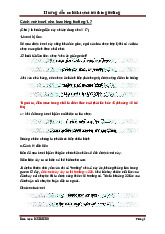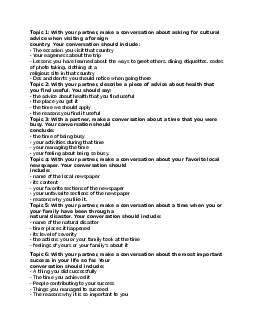










Preview text:
lOMoARcPSD|36041561
Dr. Christopher Denis-Delacour/Global Language
HISTORY OF ENGLISH AND LANGUAGE USE Name : Date :
Dead Language in Global English? INDIVIDUAL ACTIVITY 1 Find out
There are many Latin and Greek expressions in English. Find out what the
abbreviations below actually mean (at least 5). 1. A.C. : 2. A.D. : 3. ad inf., ad infin. : 4. A.M. : 5. ca., cir., circ. : 6. cf. : 7. e.g. : 8. etc. : 9. id. : 10. i.e. : 11. in loc. : 12. M.D. : 13. N.B. : 1
History of English and Language Use
Downloaded by Nga T??ng (ngahuong55@gmail.com) lOMoARcPSD|36041561
Dr. Christopher Denis-Delacour/Global Language 14. No. : 15. per an. : 16. per cent. : 17. Ph. D. : 18. P.M. : 19. P.S. : 20. R.I.P. : 21. vox pop. : 22. vs. : 23. v.s. :
The History of English in 10 minutes! INDIVIDUAL ACTIVITY 2 Instructions
While you are watching the video presentation, please answer the following questions. Video questionnaire Chapter 1-The Anglo-Saxons. True or False?
1. Latin had a long-lasting impact on the English language: T/F
2. Besides Anglos and Saxons, another Germanic tribe called the Jutes settled in Britain: T/F
3. Anglo-Saxon words became popular as they referred to simple everyday things: T/F 2
History of English and Language Use
Downloaded by Nga T??ng (ngahuong55@gmail.com) lOMoARcPSD|36041561
Dr. Christopher Denis-Delacour/Global Language
4. All days of the week in English are named after Anglo-Saxon gods: T/F
5. The Jutes helped to revive the Latin influence on the English Language: T/F
6. Last Vikings contributed with 200 new words to English Language: T/F Chapter 2-The Norman conquest. Complete the sentences:
1. In _____ William the __________ invades _________ .
2. The Normans make French the language of all _____________ .
3. Latin was still used in __________ .
4. The common people still speak _____________ .
5. Cow, sheep, and swine come from __________ while words
such as _______________ come from the Norman ruling classes.
6. All in all, the English absorbed ___________ from the Normans.
7. It all ended with the ______________ war which in fact lasted _________ .
Chapter 6-Englishes & Empires.
Complete the tables: Where did English pick-up the following words?
Voodoo – Boomerang – Barbecue – Kangaroo – Bungalow –
Walkabout – Cannibal – Canoe – Yoga – Crimson – Zombie – Nugget 3
History of English and Language Use
Downloaded by Nga T??ng (ngahuong55@gmail.com) lOMoARcPSD|36041561
Dr. Christopher Denis-Delacour/Global Language Caribbean India Africa Australia Chapter 8-American English Complete the sentences:
1. The words ‘raccoon’, ‘squash’, and ‘moose’ come from _____ .
2. The ________ language gave the words ‘coleslaw’ and ‘cookies’ to English.
3. The German immigrants brought the words ________ and Latin __________ .
4. Italian brings their famous _______ , _______ and Mafia to the American vocabulary.
5. As a __________ country, the U.S introduced a range of
vocabulary related to finance and profits such as __________
,_______ and _________. While words categorize people
according to their earnings and job such as _______________. Chapter 9-Internet English
1. Note down the new vocabulary related to internet:
………………………………………………………………………………
………………………………………………………………………………
……………………………………………………………………………… 4
History of English and Language Use
Downloaded by Nga T??ng (ngahuong55@gmail.com) lOMoARcPSD|36041561
Dr. Christopher Denis-Delacour/Global Language
………………………………………………………………………………
………………………………………………………………………………
2. Write the long form of the following abbreviations: IMHO: BTW: FYI: LOL: FAQ: UG2BK: BFF: Chapter 10-Global English Take notes:
………………………………………………………………………………
………………………………………………………………………………
………………………………………………………………………………
………………………………………………………………………………
………………………………………………………………………………
………………………………………………………………………………
………………………………………………………………………………
……………………………………………………………………………… 5
History of English and Language Use
Downloaded by Nga T??ng (ngahuong55@gmail.com) lOMoARcPSD|36041561
Dr. Christopher Denis-Delacour/Global Language
………………………………………………………………………………
………………………………………………………………………………
………………………………………………………………………………
………………………………………………………………………………
………………………………………………………………………………
………………………………………………………………………………
DIALECT, STANDARDIZATION, AND LANGUAGE USE IN GROUP ACTIVITY 1 Instructions:
In group read the 2 following statements then reflect on the
following questions - Take notes of the comments and key ideas of
your discussion below the 2 extracts.
- In terms of Attitude and Judgements, what are the consequences of
standard and varieties? Provide examples related to industry/job
contexts. What is the future of varieties of English?
- Is the English Standard inclusive and matching with the language
use around the world? According to the history of English, what will
be the future of Standard English? Provide examples. Statement 1
The Prince of Wales highlighted the threat to “proper” English from the spread of
American vernacular yesterday as he launched a campaign to preserve the language as
world leader. He described American English as “very corrupting” and emphasised the
need to maintain the quality of language, after giving his backing to the British 6
History of English and Language Use
Downloaded by Nga T??ng (ngahuong55@gmail.com) lOMoARcPSD|36041561
Dr. Christopher Denis-Delacour/Global Language
Council’s English 2000 project . . . Speaking after the launch, Prince Charles
elaborated on his view of the American influence. “People tend to invent all sorts of
nouns and verbs, and make words that shouldn’t be. I think we have to be a bit careful,
otherwise the whole thing can get rather a mess.”
(The Times, 24 March 1995) Statement 2
Language standards are rarely contested, even by those who are engaged in radical
and far-reaching social critique. Yet, standards discriminate against those who don’t
conform, and language standardisation has systematically worked against the
underclass as well as women and minorities . . . The existence of standards, however
objectionable, cannot be denied, so the only viable option, politically at any rate, is to
work towards broadening the standard to include the greatest variety possible,
particularly the ‘uneducated’ arenas of usage which have so far been considered
inappropriate, mistaken, even pathological. (Parakrama 1995: back cover)
Take notes of the group discussion:
………………………………………………………………………………
………………………………………………………………………………
………………………………………………………………………………
………………………………………………………………………………
………………………………………………………………………………
………………………………………………………………………………
………………………………………………………………………………
………………………………………………………………………………
………………………………………………………………………………
………………………………………………………………………………
……………………………………………………………………………… 7
History of English and Language Use
Downloaded by Nga T??ng (ngahuong55@gmail.com) lOMoARcPSD|36041561
Dr. Christopher Denis-Delacour/Global Language
ENGLISH LANGUAGE AND COUNTRIES FACT SHEET1 IN GROUP ACTIVITY 2 Research:
Work in groups. Each group draws a country and uses the Internet to find the
information asked for in the boxes below. Scotland is given as an example here.
There may be many different answers for culture, music, film, and sport so choose
options that you feel tell you something about the country, or which are typical for the country.
Present your findings to the whole class. You can collect all the answers in a
shared document that everyone has access to.
Copy and paste the country you are working on into your text editor. Scotland: England: Capital: Edinburgh Capital:
Official Languages and Dialects: English, Gaelic
Official Languages and Dialects:
Why do they speak English? Because most of the Why do they speak English?
population descend from the Anglo Saxons. Some Political system:
also speak Gaelic or Scots (a local variation of Culture: English) Music: Film:
Political system: Constitutional monarchy, has its Sport:
own Parliament with some self rule
Culture: Clans, kilts, whisky, haggis 1 Competence goals:
-write different types of formal and informal texts, including multimedia texts with structure
and coherence that describe, discuss, reason and reflect adapted to the purpose, receiver and situation.
-use different sources in a critical, appropriate and verifiable manner. 8
History of English and Language Use
Downloaded by Nga T??ng (ngahuong55@gmail.com) lOMoARcPSD|36041561
Dr. Christopher Denis-Delacour/Global Language Music: Bagpipes, Amazing Grace Film: Braveheart
Sport: Rugby, golf, Highland Games Wales:
Republic of Ireland (EIRE): Capital: Capital:
Official Languages and Dialects:
Official Languages and Dialects: Why do they speak English? Why do they speak English? Political system: Political system: Culture: Culture: Music: Music: Film: Film: Sport: Sport: The USA: Australia: Capital: Capital:
Official Languages and Dialects
Official Languages and Dialects: Why do they speak English? Why do they speak English? Political system: Political system: Culture: Culture: Music: Music: Film: Film: Sport: Sport: New Zealand: Botswana: Capital: Capital:
Official Languages and Dialects:
Official Languages and Dialects: Why do they speak English? Why do they speak English? Political system: Political system: Culture: Culture: Music: Music: Film: Film: Sport: Sport: South Africa: The Philippines: 9
History of English and Language Use
Downloaded by Nga T??ng (ngahuong55@gmail.com) lOMoARcPSD|36041561
Dr. Christopher Denis-Delacour/Global Language Capital: Capital:
Official Languages and Dialects:
Official Languages and Dialects: Why do they speak English? Why do they speak English? Political system: Political system: Culture: Culture: Music: Music: Film: Film: Sport: Sport: India: Jamaica: Capital: Capital:
Official Languages and Dialects:
Official Languages and Dialects: Why do they speak English? Why do they speak English? Political system: Political system: Culture: Culture: Music: Music: Film: Film: Sport: Sport:
Northern Ireland (Ulster): Uganda Capital: Capital:
Official Languages and Dialects:
Official Languages and Dialects: Why do they speak English? Why do they speak English? Political system: Political system: Culture: Culture: Music: Music: Film: Film: Sport: Sport: Ghana: Malta: Capital: Capital:
Official Languages and Dialects:
Official Languages and Dialects: Why do they speak English? Why do they speak English? Political system: Political system: Culture: Culture: Music: Music: Sport: Sport 10
History of English and Language Use
Downloaded by Nga T??ng (ngahuong55@gmail.com) lOMoARcPSD|36041561
Dr. Christopher Denis-Delacour/Global Language Virgin Islands: Nigeria: Capital: Capital:
Official Languages and Dialects:
Official Languages and Dialects: Why do they speak English? Why do they speak English? Political system: Political system: Culture: Culture: Music: Music: Sport: Sport: Canada: Singapore: Capital: Capital:
Official Languages and Dialects:
Official Languages and Dialects: Why do they speak English? Why do they speak English? Political system: Political system: Culture: Culture: Music: Music: Sport Sport 11
History of English and Language Use
Downloaded by Nga T??ng (ngahuong55@gmail.com)




